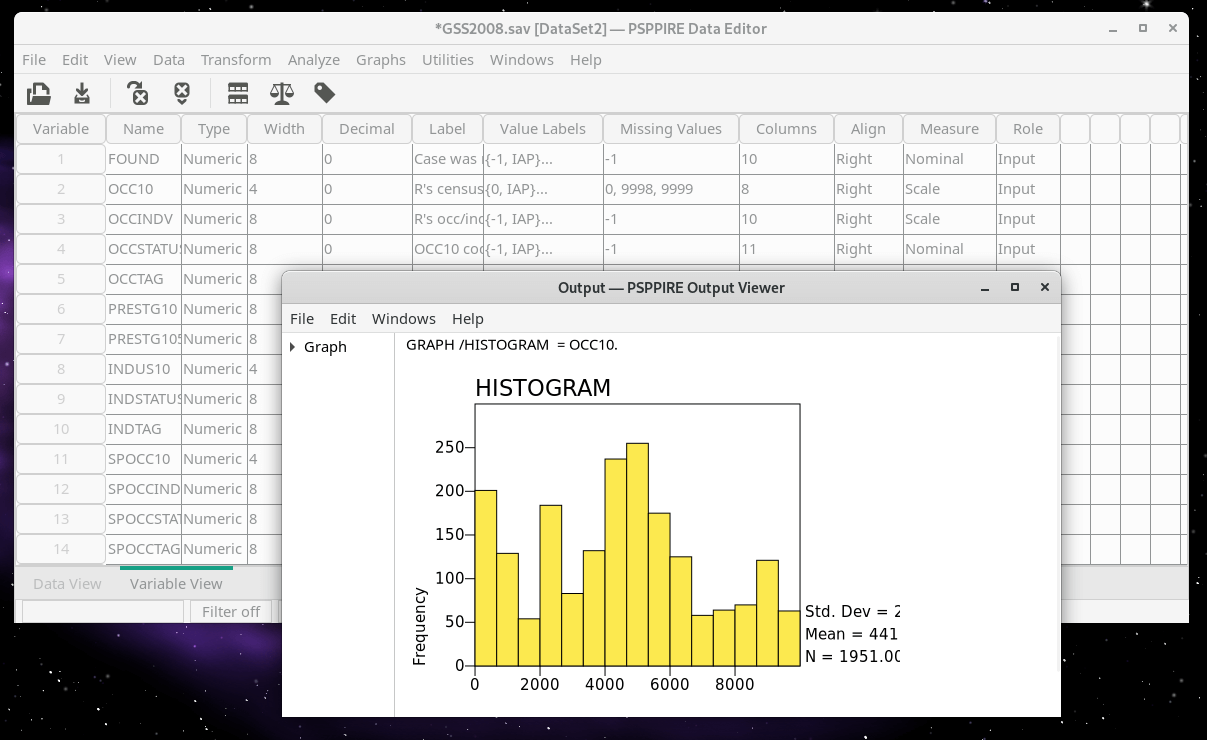PSPP is a command-line program for statistical analysis of sampled data. It is intended as a free replacement of the proprietary program, SPSS.
It interprets commands in the SPSS language and produces output in two forms: tables and charts, and tabular output in ASCII, PostScript, or HTML format.
It already supports a large subset of SPSS’s transformation language. Its statistical procedure support is currently limited, but increasing.
Features include:
- Supports over 1 billion cases.
- Supports over 1 billion variables.
- Import Excel, Gnumeric, OpenDocument spreadsheets, Comma Separated Values and ASCII files as well as Postgres databases.
- Export to SPSS ‘Portable’, ‘system’, and ASCII.
- Performs T-tests (One Sample, Independent Samples, and Paired Samples Modes), ANOVA, linear regression and other statistical operations.
- Recode, rearrange, and manipulate data.
- High-quality output formatting:
- Presentation-quality tables on suitable devices, such as laser printers and raster displays. This is currently implemented through a PostScript driver. A simple HTML tables driver is also available.
- Other devices, such as terminals and dot-matrix printers, are supported through an ASCII driver. IBM PC box-drawing characters can also be used. Bold and italics are supported if the underlying device supports them.
- Output can be directed to multiple devices at once, for instance to a dot-matrix printer and a PostScript printer, and retain the unique output properties of each device.
- Portability: PSPP is easy to port.
Website: www.gnu.org/software/pspp
Support: Manual
Developer: Ben Pfaff and other contributors
License: GNU General Public License v3.0

PSPP is written in C. Learn C with our recommended free books and free tutorials.
Return to Scientific | Return to Statistical Analysis
| Popular series | |
|---|---|
| The largest compilation of the best free and open source software in the universe. Each article is supplied with a legendary ratings chart helping you to make informed decisions. | |
| Hundreds of in-depth reviews offering our unbiased and expert opinion on software. We offer helpful and impartial information. | |
| The Big List of Active Linux Distros is a large compilation of actively developed Linux distributions. | |
| Replace proprietary software with open source alternatives: Google, Microsoft, Apple, Adobe, IBM, Autodesk, Oracle, Atlassian, Corel, Cisco, Intuit, and SAS. | |
| Awesome Free Linux Games Tools showcases a series of tools that making gaming on Linux a more pleasurable experience. This is a new series. | |
| Machine Learning explores practical applications of machine learning and deep learning from a Linux perspective. We've written reviews of more than 40 self-hosted apps. All are free and open source. | |
| New to Linux? Read our Linux for Starters series. We start right at the basics and teach you everything you need to know to get started with Linux. | |
| Alternatives to popular CLI tools showcases essential tools that are modern replacements for core Linux utilities. | |
| Essential Linux system tools focuses on small, indispensable utilities, useful for system administrators as well as regular users. | |
| Linux utilities to maximise your productivity. Small, indispensable tools, useful for anyone running a Linux machine. | |
| Surveys popular streaming services from a Linux perspective: Amazon Music Unlimited, Myuzi, Spotify, Deezer, Tidal. | |
| Saving Money with Linux looks at how you can reduce your energy bills running Linux. | |
| Home computers became commonplace in the 1980s. Emulate home computers including the Commodore 64, Amiga, Atari ST, ZX81, Amstrad CPC, and ZX Spectrum. | |
| Now and Then examines how promising open source software fared over the years. It can be a bumpy ride. | |
| Linux at Home looks at a range of home activities where Linux can play its part, making the most of our time at home, keeping active and engaged. | |
| Linux Candy reveals the lighter side of Linux. Have some fun and escape from the daily drudgery. | |
| Getting Started with Docker helps you master Docker, a set of platform as a service products that delivers software in packages called containers. | |
| Best Free Android Apps. We showcase free Android apps that are definitely worth downloading. There's a strict eligibility criteria for inclusion in this series. | |
| These best free books accelerate your learning of every programming language. Learn a new language today! | |
| These free tutorials offer the perfect tonic to our free programming books series. | |
| Linux Around The World showcases usergroups that are relevant to Linux enthusiasts. Great ways to meet up with fellow enthusiasts. | |
| Stars and Stripes is an occasional series looking at the impact of Linux in the USA. | |

very nice tutorial!